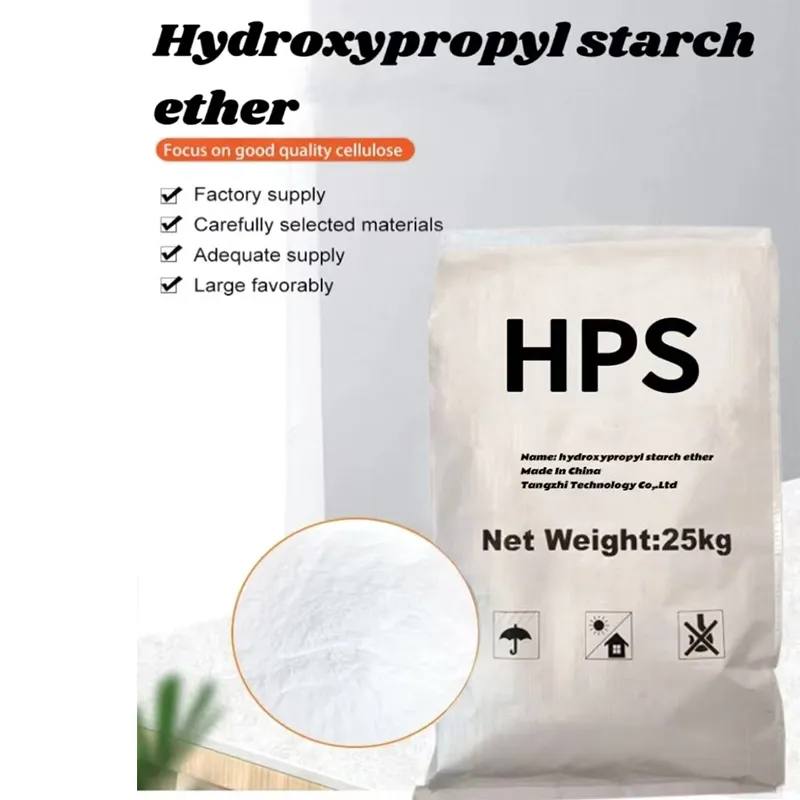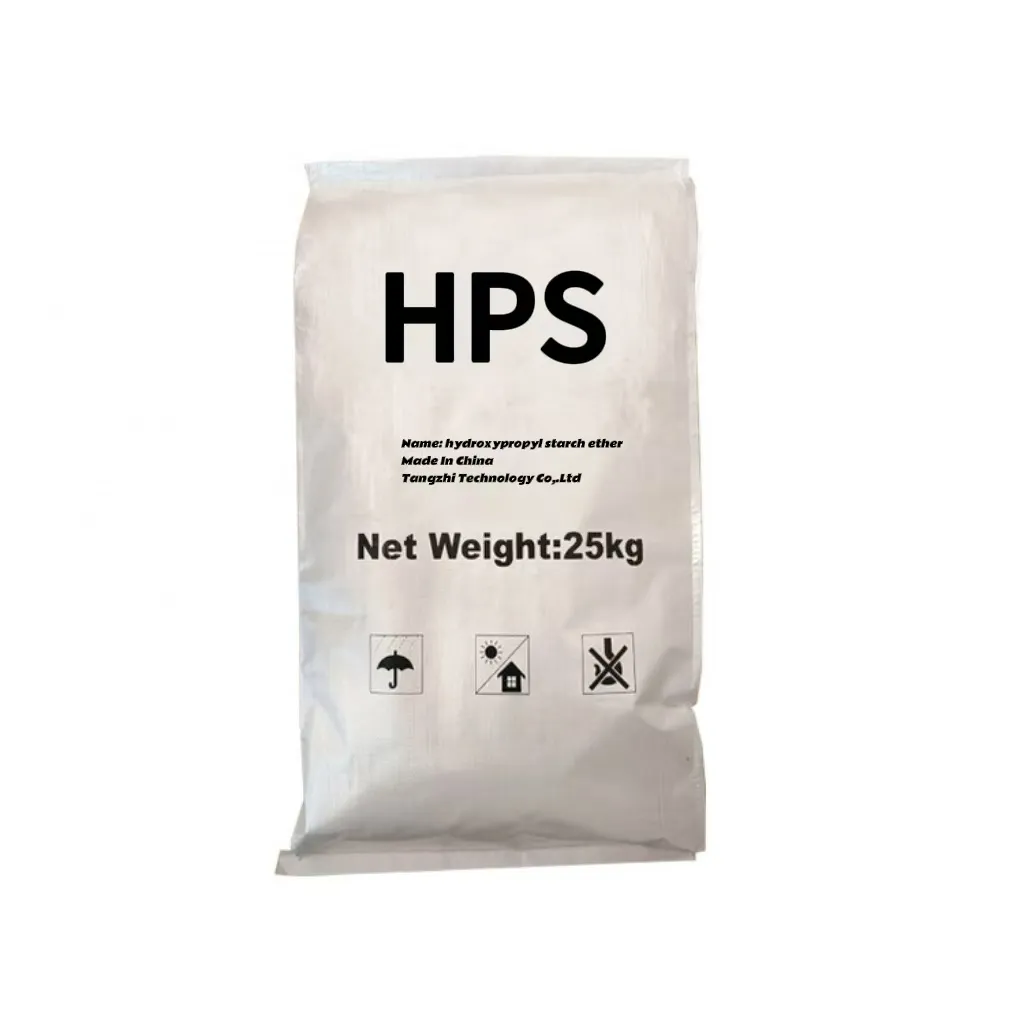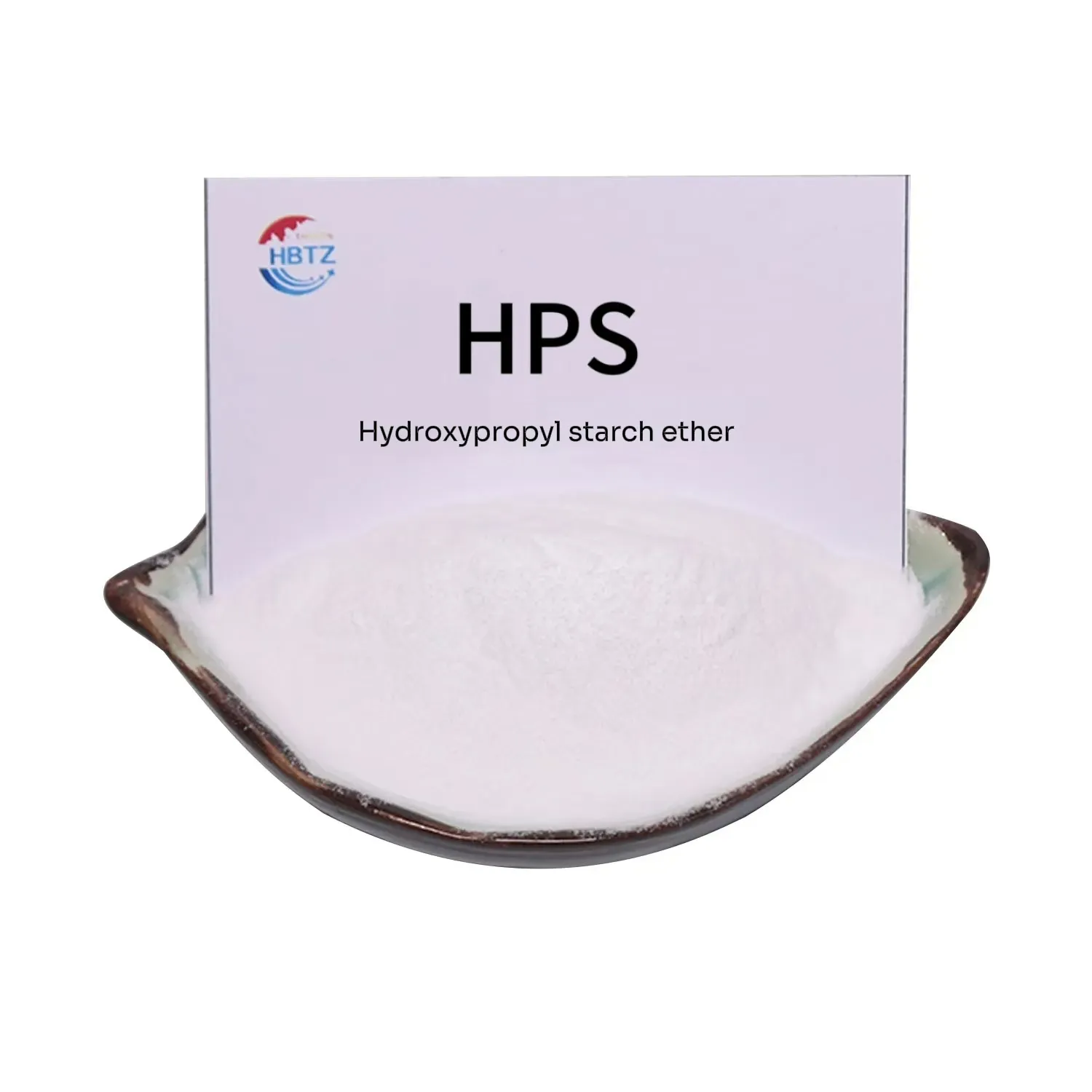
Discover Pure Hydroxy Starch: Superior Thickener & Stabilizer
Understanding Hydroxy Starch: A Key Polymer in Industrial Applications
In the realm of industrial additives, hydroxy starch represents a critical class of modified polysaccharides derived from natural starches. These versatile polymers are engineered to enhance specific properties in a wide array of formulations, from construction materials to personal care products. Through controlled chemical modification, native starch gains superior functional attributes such as improved thickening, water retention, film-forming capabilities, and enhanced stability across varying environmental conditions. Our focus here is on Hydroxypropyl Starch Ether (HPS), a prominent variant known for its exceptional performance in demanding B2B applications. This detailed overview will explore its manufacturing, applications, technical merits, and market position, providing essential insights for industry professionals seeking advanced material solutions.
The demand for high-performance, sustainable, and cost-effective additives continues to drive innovation in polymer chemistry. Modified starches, including hydroxy starch derivatives, stand out due to their biodegradability, renewable sourcing, and ability to impart tailored rheological properties. Their role is pivotal in optimizing process efficiency and final product quality, making them indispensable in today's competitive industrial landscape.
Manufacturing Process of Hydroxypropyl Starch Ether (HPS)
The production of Hydroxypropyl Starch Ether (HPS) involves a sophisticated chemical process designed to introduce hydroxypropyl groups onto the starch molecule, thereby altering its physicochemical properties. This modification significantly improves its solubility, viscosity, and stability compared to native starch. The general process flow is meticulously controlled to ensure consistent product quality and performance.
Process Flow:
- Raw Material Preparation: High-quality native starch (e.g., corn, potato, tapioca) is selected and purified. This ensures a clean base for the etherification process.
- Slurry Formation: The purified starch is mixed with water to form a slurry. An alkaline catalyst, typically sodium hydroxide, is added to swell the starch granules and activate the hydroxyl groups, making them receptive to modification.
- Etherification Reaction: Propylene oxide, the etherifying agent, is introduced into the alkaline starch slurry under controlled temperature and pressure. The propylene oxide reacts with the activated hydroxyl groups on the starch molecule, forming hydroxypropyl ether linkages. This critical step, often performed in a reactor, dictates the degree of substitution (DS), a key parameter influencing the final product's properties.
- Neutralization & Washing: After the desired degree of substitution is achieved, the reaction is quenched, and the slurry is neutralized using an acid. Extensive washing with water follows to remove unreacted reagents, salts, and by-products, ensuring product purity.
- Drying & Grinding: The purified hydroxy starch slurry is then dewatered and dried using methods like spray drying or flash drying. The dried product is subsequently ground to a fine powder, achieving a specific particle size distribution required for various applications.
- Quality Control & Packaging: Throughout the entire process, stringent quality control measures are implemented. Samples are tested for viscosity, moisture content, pH, degree of substitution, and purity. Finished HPS is then packaged into multi-ply paper bags or jumbo bags, ready for distribution.
Testing Standards: Our manufacturing adheres to international standards such as ISO 9001 for quality management and ISO 14001 for environmental management. Product-specific testing often aligns with industry-recognized analytical methods to verify critical parameters like viscosity (e.g., Brookfield viscosity), moisture content, ash content, and particle size distribution. These rigorous checks ensure that every batch of HPS meets the highest specifications for industrial use.
Service Life: When properly stored in cool, dry conditions away from direct sunlight, HPS products typically maintain their efficacy for 12-24 months from the date of manufacture. In application, the stability and service life of end products containing HPS are significantly enhanced due to the polymer's superior resistance to enzymatic degradation and retrogradation compared to native starch.
Target Industries & Advantages: While HPS is widely utilized in construction (e.g., tile adhesives, renders), detergents, and textile printing, its versatility extends to more specialized sectors. In petrochemical applications, certain modified starches can act as fluid loss additives in drilling fluids or as rheology modifiers. For metallurgy, HPS can serve as a binder in ceramic molds or refractory materials, contributing to structural integrity. In water supply & drainage, modified starches are explored for their potential as biodegradable flocculants or as components in non-toxic pipe coatings, indirectly contributing to corrosion resistance. The inherent advantages in typical application scenarios include enhancing workability, improving adhesion, and extending the durability of the final product, thus leading to indirect energy savings through reduced rework and prolonged infrastructure lifespan.
Industry Trends and Market Dynamics for Modified Starches
The global market for modified starches, including hydroxy starch variants like HPS, is experiencing robust growth driven by increasing demand from the construction, food & beverage, textile, paper, and pharmaceutical sectors. Key trends include a heightened focus on sustainability, the adoption of bio-based materials, and continuous innovation in polymer science to develop highly specialized functionalities. The market size for modified starches was estimated at USD 11.5 billion in 2022 and is projected to reach USD 15.6 billion by 2028, growing at a CAGR of 5.2% during the forecast period (Source: MarketsandMarkets, 2023).
The shift towards eco-friendly building materials, for instance, has significantly bolstered the demand for HPS in dry-mix mortars, where it improves rheology, anti-sag properties, and water retention, leading to more efficient and durable construction. Similarly, in the personal care industry, related compounds like hydroxyethyl cellulose and hydroxypropyl starch phosphate hair are increasingly favored for their natural origin and superior performance as thickeners, stabilizers, and emulsifiers in shampoos, conditioners, and styling products. The integration of advanced polymer chemistry allows for tailored solutions that meet stringent performance requirements while adhering to environmental guidelines.

Figure 1: High-quality Hydroxypropyl Starch Ether (HPS) powder for industrial applications.
Technical Specifications & Product Parameters of HPS
The efficacy of Hydroxypropyl Starch Ether is defined by a precise set of technical parameters, which are crucial for ensuring its suitability for specific industrial applications. These parameters guarantee consistent performance and assist formulators in achieving desired product characteristics.
| Parameter | Unit | Specification Range | Test Method |
|---|---|---|---|
| Appearance | - | White to off-white powder | Visual |
| Moisture Content | % | ≤ 10.0 | ISO 712 / Karl Fischer |
| pH (2% solution) | - | 6.0 - 8.0 | pH Meter |
| Viscosity (2% solution, Brookfield, 20 rpm) | mPa.s | 1500 - 4000 | ASTM D2364 |
| Ash Content | % | ≤ 2.0 | ISO 2171 |
| Degree of Substitution (DS) | - | 0.05 - 0.15 | Titration / GC |
| Particle Size (>180 µm) | % | ≤ 5.0 | Sieve Analysis |
These specifications ensure that our hydroxy starch products provide optimal performance. For instance, the viscosity range is crucial for controlling the consistency of mortars and paints, while low moisture content guarantees product stability and ease of handling. A precisely controlled Degree of Substitution (DS) directly influences the polymer's water solubility, resistance to enzymatic degradation, and overall thickening efficiency.
Application Scenarios & In-depth Case Studies
Hydroxypropyl Starch Ether (HPS) is highly valued across diverse industries for its unique functional attributes. Its ability to modify rheology, improve adhesion, and enhance water retention makes it an indispensable additive.
Key Application Areas:
- Construction Industry: HPS significantly improves the performance of dry-mix mortars, tile adhesives, renders, plasters, and self-leveling compounds. It enhances anti-sag properties, workability, open time, and adhesion strength, contributing to more robust and long-lasting structures.
- Detergent and Cleaning Products: Used as a thickener, stabilizer, and suspending agent in liquid detergents, dishwashing liquids, and industrial cleaners, ensuring consistent product texture and efficacy.
- Textile Printing: Functions as a thickening agent in textile printing pastes, providing sharp outlines, uniform color distribution, and improved color yield.
- Paints & Coatings: Contributes to rheology control, anti-settling, and film-forming properties in water-based paints, improving brushability and overall coating performance.
- Personal Care & Cosmetics: Though more commonly associated with hydroxyethyl cellulose and specialized compounds like hydroxypropyl starch phosphate hair, HPS can also find applications as a natural thickener and binder in some cosmetic formulations.
Application Case Study: High-Performance Tile Adhesive
Client Challenge: A leading construction materials manufacturer sought to improve the workability, anti-sag properties, and adhesion strength of their premium tile adhesive for large-format tiles, particularly in vertical applications. Existing formulations exhibited excessive slump and limited open time, hindering installation efficiency.
Solution Implemented: Our technical team collaborated with the client to integrate a precisely optimized grade of hydroxy starch (HPS) into their tile adhesive formulation. The HPS was selected for its high thickening efficiency, excellent pseudo-plasticity, and strong water retention capabilities.
Results & Customer Feedback: The inclusion of HPS demonstrably improved the adhesive's performance. The anti-sag value increased by 30%, allowing for secure vertical tile installation without slippage. Open time was extended by 15 minutes, providing installers with more flexibility. Furthermore, the adhesive exhibited superior trowelability and reduced stickiness, leading to positive feedback from applicators regarding ease of use and reduced fatigue. This led to a 20% increase in product adoption for premium projects.

Figure 2: HPS playing a crucial role in enhancing construction material performance.
Technical Advantages of Hydroxypropyl Starch Ether
The selection of hydroxy starch over other rheology modifiers is often predicated on its distinct technical advantages, which translate into significant benefits for industrial users.
- Superior Thickening Efficiency: HPS provides excellent viscosity build-up at lower dosage rates compared to many other thickeners, making it a cost-effective solution.
- Enhanced Water Retention: Its modified structure significantly improves water-holding capacity, which is crucial in applications like dry-mix mortars to prevent premature drying and ensure proper hydration of cementitious binders. This directly contributes to the improved strength and durability of the final product, extending its service life and thereby offering an indirect form of "corrosion resistance" for the building components by maintaining structural integrity.
- Excellent Pseudo-plasticity (Shear-Thinning): HPS imparts desirable rheological properties, allowing formulations to be easily mixed and applied under shear stress (e.g., troweling), yet quickly recover viscosity when at rest, preventing slump. This optimized flow behavior contributes to "energy saving" during application processes by reducing effort and increasing efficiency.
- Improved Anti-Sag and Anti-Slip Properties: Particularly beneficial in construction, HPS helps prevent vertical surfaces from sagging or tiles from slipping, ensuring precise and robust application.
- Compatibility: HPS is highly compatible with other common additives used in various industrial formulations, allowing for synergistic effects and complex system development.
- Sustainability: As a derivative of natural starch, HPS is biodegradable and derived from renewable resources, aligning with increasing industry demands for environmentally friendly materials.
These technical attributes translate into direct operational efficiencies and enhanced product performance, providing a competitive edge for manufacturers. The ability to achieve desired rheology with lower dosages, coupled with improved workability, reduces material waste and application time, ultimately contributing to better project economics and sustainable practices.
Vendor Comparison & Customized Solutions
Choosing the right supplier for hydroxy starch is crucial for ensuring consistent quality, reliable supply, and tailored technical support. While many vendors offer modified starches, differentiating factors often lie in their manufacturing consistency, technical expertise, and ability to provide customized solutions.
Key Differentiators in Vendor Selection:
- Manufacturing Excellence: Look for vendors with robust quality control systems, adherence to ISO standards, and advanced production facilities that ensure batch-to-batch consistency.
- Technical Support & R&D: A strong technical team capable of offering formulation advice, troubleshooting, and co-development of new applications is invaluable.
- Global Supply Chain & Logistics: Reliable global distribution networks and efficient logistics ensure timely delivery and minimize supply chain risks.
- Product Portfolio: A diverse range of modified starches and related polymers (e.g., cellulosics like hydroxyethyl cellulose) indicates broad expertise and the potential for integrated solutions.
- Sustainability Credentials: Commitment to responsible sourcing, eco-friendly manufacturing, and biodegradable products.
Customized Solutions:
Recognizing that off-the-shelf solutions may not always meet unique application requirements, we specialize in providing customized Hydroxypropyl Starch Ether formulations. Our approach involves:
- Needs Assessment: In-depth consultation to understand specific performance criteria, processing conditions, and end-product demands.
- Tailored Modification: Adjusting parameters like the degree of substitution, molecular weight, and particle size distribution to achieve precise rheological profiles, water retention, and stability characteristics.
- Joint Development: Collaborative R&D efforts, including laboratory trials and pilot productions, to refine and validate the customized HPS product.
- Scalable Production: Ensuring that customized solutions can be scaled efficiently from laboratory to commercial production without compromising quality or cost-effectiveness.
This bespoke service ensures that our clients receive a hydroxy starch product perfectly engineered for their specific needs, optimizing performance and fostering innovation in their respective markets.

Figure 3: Advanced laboratory for quality control and customized solution development.
Ensuring Quality: Certifications, Authority, and Test Data
Authoritativeness and trustworthiness are paramount in the B2B chemical supply chain. Our commitment to quality is demonstrated through stringent adherence to international standards, comprehensive certifications, and transparent reporting of test data.
Certifications and Compliance:
- ISO 9001: Certified for Quality Management Systems, ensuring consistent product quality and customer satisfaction.
- ISO 14001: Certified for Environmental Management Systems, reflecting our commitment to sustainable and environmentally responsible manufacturing practices.
- REACH Compliance: All products comply with the European Union's REACH regulation, ensuring chemical safety and regulatory adherence for market access.
- FDA/Food Grade (where applicable): For specific grades of modified starches intended for food contact or food additive use, relevant certifications such as FDA or specific food-grade standards are met, though our primary HPS product is geared for industrial uses.
Our long-standing relationships with global partners and a track record spanning over 15 years in the industry attest to our reliability and expertise in manufacturing high-quality hydroxy starch products. We collaborate with independent third-party laboratories to validate our internal test data, providing an additional layer of assurance to our clients.
Example Test Data (Rheology Profile):
| Parameter | Native Starch Solution (2%) | Hydroxypropyl Starch Ether (HPS) Solution (2%) |
|---|---|---|
| Initial Viscosity (mPa.s) | 50 - 150 | 1500 - 4000 |
| Shear-Thinning Behavior | Moderate | Strong Pseudo-plasticity |
| Stability (24 hrs, 25°C) | Settling/Syneresis Observed | Stable, No Settling |
| Enzymatic Resistance | Low | High |
| Film-Forming Ability | Brittle | Flexible & Clear |
This comparison clearly illustrates the superior functional performance imparted by the hydroxypropyl modification, making HPS a far more robust and reliable choice for demanding industrial applications than native starch.
Trust and Support: FAQ, Lead Time, Warranty & After-Sales
Building long-term partnerships in the B2B sector relies heavily on transparency, reliability, and exceptional customer support. We are committed to providing comprehensive support throughout the entire customer journey.
Frequently Asked Questions (FAQ):
Q1: What is the recommended storage condition for HPS?
A1: HPS should be stored in a cool, dry place, ideally below 30°C and at relative humidity below 70%, in its original sealed packaging. Avoid direct sunlight and moisture to maintain product integrity.
Q2: Can HPS be used in conjunction with other cellulose ethers?
A2: Yes, HPS is highly compatible with other cellulose ethers, such as hydroxyethyl cellulose or HPMC. In many construction and paint formulations, HPS is used synergistically with these polymers to achieve optimized rheological profiles and enhanced performance benefits like improved thixotropy and water retention.
Q3: What is the typical lead time for an order?
A3: Standard orders typically have a lead time of 7-14 business days, depending on volume and destination. For customized solutions or large-volume orders, lead times will be confirmed upon order placement and production scheduling.
Lead Time & Fulfillment Details:
We maintain efficient production schedules and robust inventory management to ensure timely fulfillment. Our global logistics network facilitates prompt and secure delivery to various international destinations. We provide detailed tracking information and work closely with freight partners to manage any unforeseen delays effectively.
Warranty Commitments:
Our Hydroxypropyl Starch Ether products are guaranteed to meet the published technical specifications for a period of 12 months from the date of manufacture, provided they are stored and handled according to our recommendations. In the unlikely event of a product defect or non-conformance, we are committed to promptly investigating the issue and offering appropriate remedies, including replacement or credit.
Customer Support Information:
Our dedicated customer support team and technical experts are available to assist with product inquiries, technical specifications, application guidance, and troubleshooting. We offer comprehensive pre-sales consultation and post-sales support to ensure optimal product integration and performance.
Contact Us: For immediate assistance or to discuss your specific requirements for hydroxy starch, please reach out via our website's contact form or directly through our sales department.
Conclusion
Hydroxypropyl Starch Ether (HPS) stands as a testament to advanced polymer engineering, offering unparalleled functional benefits across a spectrum of industrial applications. Its robust performance in areas such as rheology modification, water retention, and enhanced stability positions it as a preferred choice for manufacturers striving for superior product quality and operational efficiency. By leveraging the technical advantages of hydroxy starch, businesses can achieve higher performance standards, optimize their formulations, and contribute to more sustainable practices. Our commitment to quality, technical innovation, and dedicated customer support ensures that clients receive not just a product, but a comprehensive solution tailored to their specific needs.
References
- MarketsandMarkets. (2023). Modified Starch Market - Global Forecast to 2028.
- International Organization for Standardization (ISO). (Current Year). ISO 9001: Quality Management Systems – Requirements.
- Biliaderis, C. G. (1991). The structure and interaction of starch with other components in food systems. Food Technology, 45(6), 98-106.
- Rutenberg, M. W. (2009). Starch and its modifications. In Industrial Gums (pp. 53-100). Academic Press.
-
Reliable Powdered Cellulose Supplier: Quality, Sustainability & InnovationNewsNov.24,2025
-
Find Trusted Microfibrillated Cellulose Suppliers for Sustainable Industrial SolutionsNewsNov.24,2025
-
Leading Methocel Suppliers: Quality, Innovation & Sustainability in Methylcellulose SupplyNewsNov.23,2025
-
Reliable Hydroxyethylcellulose Suppliers for Industry & Sustainability | Tangzhi HPMCNewsNov.23,2025
-
Top Ethyl Cellulose Supplier – Quality, Sustainability, and Industrial SupportNewsNov.23,2025
-
Trusted CMC Powder Suppliers for Food, Pharma & Industrial Use | Tangzhi HPMCNewsNov.22,2025





















